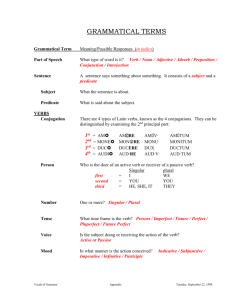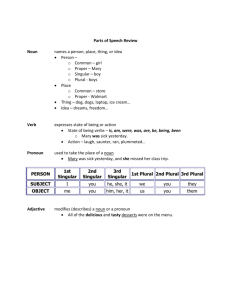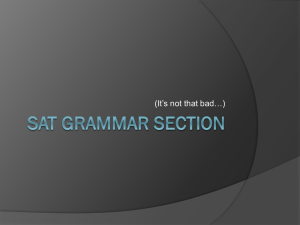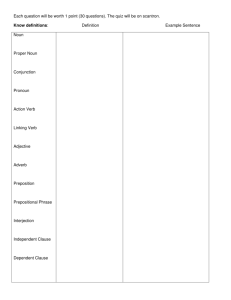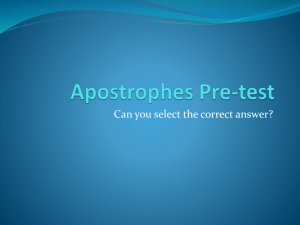PSAT Writing: Identifying Sentence Errors Practice
advertisement
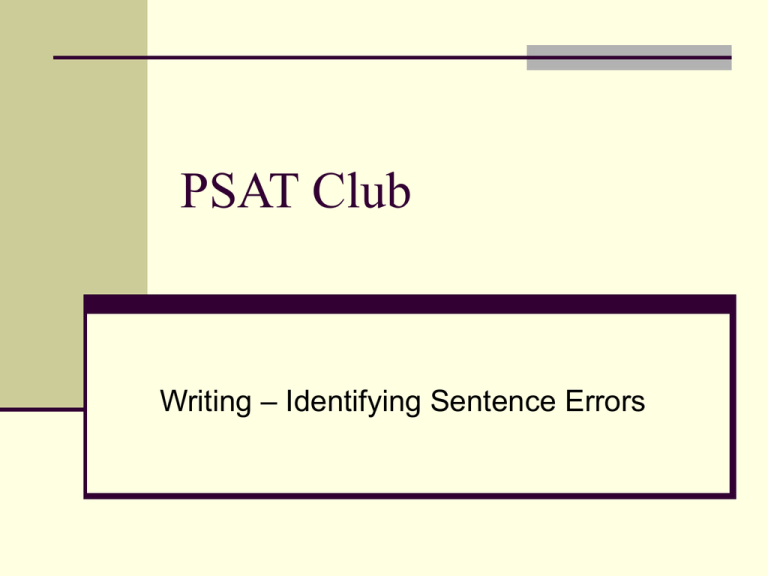
PSAT Club Writing – Identifying Sentence Errors General Hints Here are some general hints for Identifying Sentence Errors. Read the entire sentence carefully but quickly. Look at choices (A) through (D) to see whether anything needs to be changed to make the sentence correct. Don't waste time searching for errors. Mark (E) No error, on your answer sheet if you believe the sentence is correct as written. Move quickly through questions about Identifying Sentence Errors. The other kinds of questions (Improving Sentences and Improving Paragraphs) will probably take more time. Mark questions that seem hard for you and return to them later. Directions The following sentences test your knowledge of grammar, usage, word choice, and idiom. Some sentences are correct. No sentence contains more than one error. You will find that the error, if there is one, is underlined and lettered. Elements of the sentence that are not underlined will not be changed. In choosing answers, follow the requirements of standard written English. Directions: If there is an error, select the one underlined part that must be changed to make the sentence correct. If there is no error, select E. Practice Question 1 Directions: If there is an error, select the one underlined part that must be changed to make the sentence correct. If there is no error, select E. Answer 1 Correct Answer: B Explanation: This sentence illustrates a subject-verb agreement error. The subject, "Sponsors of the Olympic Games who bought advertising time on United States television," is plural; the word underlined at choice B should be "include," to match the number of the subject. The correct sentence reads: Sponsors of the Olympic Games who bought advertising time on United States television include at least a dozen international firms whose names are familiar to American consumers. Practice Question 2 Answer 2 Correct Answer: D Explanation: The error in this sentence is (D): the pronoun "you" is not consistent with the pronoun "one" in the introductory clause. The pronoun "you" should be changed to "one." The correct sentence reads: If one is interested in learning even more about Zora Neale Hurston, one should read Robert Hemenway's biography. Practice Question 3 Answer 3 Correct Answer: D Explanation: The error in the sentence is (D): the pronoun "their" in the phrase "of their" should be "it" because the pronoun refers to the singular noun "starling." Note that the verb following "starling" is singular, forcing one to recognize that the noun "starling" is singular. The correct sentence reads: The starling is such a pest in rural areas that it has become necessary to find ways of controlling the growth of its population. Practice Question 4 Answer 4 Correct Answer: B Explanation: The error in this sentence is (B): the verb "were" (which is plural) does not agree in number with the noun "thinking" (which is singular). The correct sentence reads: In the early twentieth century, new thinking about symbolism and the unconscious was greatly inspired by the writings of Sigmund Freud and Carl Jung. Practice Question 5 Answer 5 Correct Answer: C Explanation: The error in this sentence is (C): the verb "has" (which is singular) does not agree in number with the noun "effects" (which is plural). The noun phrase "harmful effects" is the subject of the verb phrase "has become known." The correct sentence reads: Air pollution caused by industrial fumes has been studied for years, but only recently have the harmful effects of noise pollution become known. Practice Question 6 Answer 6 Correct Answer: C Explanation: The error in this sentence is (C): the plural verb "are" does not agree in number with its singular subject, "pine." The correct sentence reads: Pine, like other softwoods that ignite quickly, is useful as kindling. Practice Question 7 Answer 7 Correct Answer: D Explanation: The error in this sentence is (D): the superlative form of the phrase "the most spirit" is not appropriate when only two characters are being compared. The appropriate form for such a comparison is "more spirit." The correct sentence reads: In many respects Anna Karenina and Emma Bovary are very similar characters, but Bovary has more spirit and determination.



